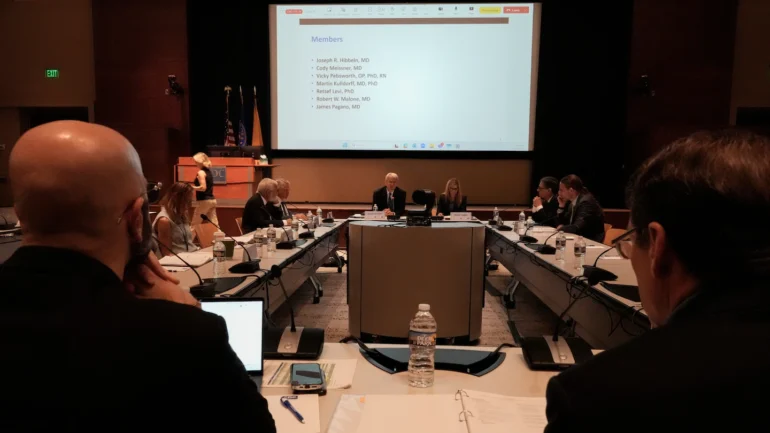On June 25, 2025, a newly formed vaccine advisory committee, appointed by Health and Human Services Secretary Robert F. Kennedy Jr., held its first meeting in Atlanta to review the U.S. childhood immunization schedule. This move has ignited a firestorm of controversy, as the panel’s decisions could reshape how and when children are vaccinated, potentially altering decades of established medical practice. With a mix of vaccine skeptics and bold claims, the meeting has raised serious questions about the future of public health.
A Radical Overhaul of the Advisory Committee
Earlier this month, Kennedy fired all 17 members of the Centers for Disease Control and Prevention’s (CDC’s) Advisory Committee on Immunization Practices (ACIP), replacing them with eight new members, many of whom have publicly questioned the safety and necessity of vaccines. The new chair, Dr. Martin Kulldorff, a biostatistician who opposed COVID-19 vaccine mandates and was reportedly fired from Harvard for refusing to get the vaccination, set a defiant tone. He criticized the media for labeling committee members as “anti-vaccine,” arguing that such attacks stifle the scientific debate and fuel vaccine hesitancy.
The panel announced it would examine the “cumulative effect” of the childhood vaccine schedule, looking at how multiple vaccines might interact with each other child’s immune system. They also plan to reevaluate vaccines that haven’t been reviewed in over seven years, including the hepatitis B vaccine given to newborns and the measles-mumps-rubella-varicella (MMRV) combination shot. These reviews could lead to changes in long-standing recommendations, such as delaying certain vaccines or altering their use.
Why the Hepatitis B Vaccine Is Contentious
One of the panel’s most debated topics is the hepatitis B vaccine, which is routinely given to newborns. Kulldorff questioned why it’s administered so early, noting that unless the mother is infected, the disease is mainly spread through sexual activity or intravenous drug use—risks irrelevant to infants. He suggested delaying the vaccine could be an option, a stance that alarms many experts who say early vaccination prevents rare but severe cases of hepatitis B in young children.
Kennedy has long criticized the childhood vaccine schedule, pointing out that today’s kids receive far more shots than previous generations did. He claimed during a recent congressional hearing that children now get “69 to 92 vaccines” by age 18, compared to the three he received as a child. However, vaccine experts counter that modern vaccines contain fewer antigens—the components that stimulate the immune system—making them less taxing than older vaccines. This means the increased number of shots doesn’t necessarily strain a child’s immune system as much as Kennedy implies.
The MMRV Vaccine Controversy Concerns
The panel is also raised concerns by revisiting the MMRV vaccine, which combines protection against measles, mumps, rubella, and chickenpox. Approved in 2005, the vaccine was linked to a slightly higher risk of febrile seizures—convulsions triggered by fever—in young children after the first dose. As a result, the CDC adjusted its guidance in 2009, recommending separate MMR and varicella shots for the first dose to minimize this risk. Kulldorff questioned why the combination shot remains an option and hinted the panel might explore alternative MMR vaccines, like the one used in Japan, or adjust its timing to address religious objections some parents have.
A Divisive Presentation on Thimerosal
Adding fuel to the fire, Lyn Redwood, an anti-vaccine activist and president emerita of Kennedy’s Children’s Health Defense, is scheduled to speak Thursday about thimerosal, a mercury-based preservative. Though removed from most childhood vaccines in 2001, it’s still used in some flu shots. Redwood argues that removing this “known neurotoxin” is crucial for child safety, but scientists emphasize there’s no evidence that the low doses of ethylmercury in thimerosal cause harm beyond minor injection-site reactions. The panel’s decision to platform Redwood has drawn sharp criticism from experts who fear it legitimizes debunked claims linking thimerosal to autism.
What’s at Stake?
The ACIP’s recommendations heavily influence which vaccines are covered by insurance and required for school entry, making its decisions far-reaching. Critics worry that the new panel’s skepticism could erode public trust in vaccines, which have slashed rates of diseases like measles and polio. Supporters, however, argue that scrutinizing the schedule ensures safety and addresses parents’ concerns.
Over the next two days, the committee will discuss vaccines for anthrax, chikungunya, COVID-19, and RSV, and vote on influenza and RSV recommendations. Notably, a work group endorsed clesrovimab, a new antibody injection to prevent severe RSV in infants, citing its effectiveness and safety, though limited trial data raised concerns about rare side effects.
A Polarizing Path Forward
Kennedy’s overhaul of the ACIP has thrust the childhood vaccine schedule into the spotlight, pitting scientific consensus against skepticism. While the panel’s defenders claim they’re fostering open inquiry, opponents fear the changes could undermine decades of progress in preventing deadly diseases. As the committee’s reviews unfold, parents, doctors, and policymakers will be watching closely, knowing the stakes couldn’t be higher for America’s children.
